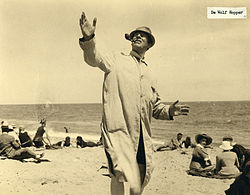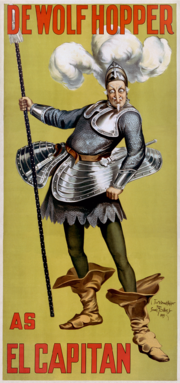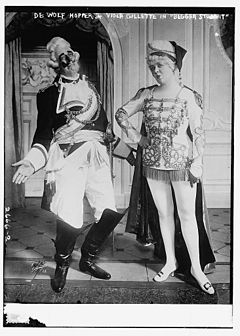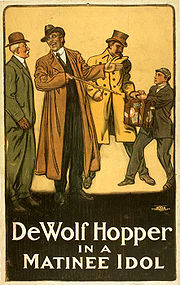- DeWolf Hopper
-
DeWolf Hopper 
DeWolf HopperBorn William De Wolf Hopper
March 30, 1858
New York City, New York, U.S.Died September 23, 1935 (aged 77)
New York City, New York, U.S.Occupation Actor, comedian, singer Years active 1878–1935 Spouse Lulu Glaser
(1925–1935)
Hedda Hopper
(1913–1924)
Nella Bergen
(1898–1913)
Edna Wallace Hopper
(1893–1898)
Ida Mosher
(1886–1892)
Ella Gardiner
(1880–1885)William DeWolf Hopper (March 30, 1858 – September 23, 1935) was an American actor, singer, comedian, and theatrical producer. Although a star of the musical stage, he was best-known for performing the popular baseball poem Casey at the Bat.
Contents
Biography
Hopper was born in New York, New York, the son of John Hopper (born 1815) and Rosalie De Wolf (born 1827). His father was a wealthy Quaker lawyer and his mother came from a noted Colonial family. Though his parents insisted he become a lawyer, Hopper did not enjoy that profession.
He made his stage debut in New Haven, Connecticut, October 2, 1878. Originally, he wanted to be a serious actor, but at 6' 5" (196 cm) and 230 pounds, he was too large for most dramatic roles. He had a loud bass singing voice, however, and made his mark in musicals, beginning in Harrigan and Hart's company. He achieved the status of leading man in The Black Hussar (1885) and appeared in the hit Erminie in 1887. Eventually, he starred in more than thirty Broadway musicals, including Castles in the Air (1890), Wang (1891), Panjandrum (1893), and John Phillip Sousa's El Capitan (1896). The role that he remembered with greatest pleasure was Old Bill in The Better 'Ole (1919).
Known for his comic talents, Hopper popularized many comic songs and appeared in a number of Gilbert and Sullivan comic "patter" roles from 1921 to 1925, including The Mikado, Patience, and H.M.S. Pinafore.[1]
A lifelong baseball enthusiast and New York Giants fan, he first performed Ernest Thayer's then-unknown poem Casey at the Bat to the Giants and Chicago Cubs the day his friend, Baseball Hall of Fame pitcher Tim Keefe had his record 19 game winning streak stopped, August 14, 1888. Hopper helped make the comic poem famous and was often called upon to give his colorful, melodramatic recitation, which he did about 10,000 times in his booming voice, reciting it during performances and as part of curtain calls, and on radio. He released a recorded version on phonograph record in 1906, and recited the poem in a short film made in the Phonofilm sound-on-film process in 1923.
It was in The Black Hussar that Hopper first incorporated a baseball theme that drew notice in the sporting press. To accompany a song with a baseball stanza, "Mr. Hopper enacts [sic] the pitcher, Mr. [Digby] Bell, with a bird cage on his head and boxing gloves on his hands, plays catcher, while Mme. [Mathilde] Cottrelly handles a diminutive bat as striker and endeavors to make a 'home run.'"
In 1889, Hopper became founding president of the Actors' Amateur Athletic Association of America. Back in 1886, besides organizing a regular ball team among actors, he played in a benefit game for a demented playwright. The following year, he helped organize an actor’s benefit for a sick young actress. In the first inning, someone presented him with an eight-inch sunflower.
Also as of 1889, Bell, Hopper and fellow McCaull Comic Opera Company actor Jefferson De Angelis were doing the following skit for their third encore in Boccaccio. Bell returns "with a bat in his hand, followed by De Wolf Hopper and De Angelis. The latter has a ball, and as Hopper takes the bat in hand and Bell acts as catcher the former goes through the customary contortion act in pitching, and as Hopper hits the ball he runs off the stage, as if running the bases, and presently returns chased by De Angelis, who passes the ball to Bell as catcher just as Hopper makes a big slide for home base [sic]. The slider tumbles Bell, and when he rises from the somersault all three yell out to the audience for judgment [a ruling], and go off kicking like Anson and [New York captain Buck] Ewing. It is a rich gag and takes immediately," the Brooklyn Eagle said.
That year, Bell called Hopper "the biggest baseball crank that ever lived. Physically, of course, he is a corker, but when I say big I mean big morally and intellectually. Why, he goes up to the baseball [Polo] grounds at One Hundred and Fifty-fifth [sic] street after the matinees on Saturday, and he travels this six miles simply to see, perhaps, the two final innings, and any one [sic] can imagine the rapidity with which he must scrape off the makeup and get into his street clothes in order to secure even this much. But he says the Garrison finishes are worth it, and he is perfectly right. Hopper always was a baseball crank, long before the public knew anything about it."
Bald from childhood (he had alopecia), Hopper wore wigs both on and offstage. In later years, a reaction to harsh medicines that he took for throat problems made his skin have a bluish tinge. Regardless, his powerful voice and great sense of humor seemed an attraction to women all his life. With an insatiable appetite for young actresses, he left a long trail of six wives and countless mistresses in his wake—he became known by the nickname "The Husband of His Country."
Hopper also appeared in several silent motion pictures, one of them a 1915 version of Don Quixote. Hopper also appeared in a few short sound films, including him reciting Casey at the Bat (1923) in an experimental film in Lee De Forest's Phonofilm process.
He made a Broadway appearance in White Lilacs (1928). He then did Radio City Music Hall Inaugural (1932), and played Dr. Gustave Ziska in The Monster (1933). At the time of his death, he was in Kansas City, Missouri, making a radio appearance.
His autobiography, "Once a Clown, Always a Clown," written with the assistance of Wesley W. Stout, was published in 1927.
Death
De Wolf Hopper died of a heart attack at age 77 in a hospital in Kansas City. His ashes are interred in Green-Wood Cemetery in the Brooklyn section of New York City.[citation needed]
Marriages
- His first wife was Ella Gardiner and they divorced.[citation needed]
- His second wife was Ida Mosher, they had one son and divorced.[citation needed]
- 1893-1898: His third wife was Edna Wallace, they divorced in 1898.[2] She later married the Wall Street broker O. Brown.[citation needed]
- 1899-1913: His fourth wife was Nella Bergen, whom he married in London in 1899. She was born a Reardon and was divorced from actor James Bergen.[3]
- 1913-1922: His fifth wife was Hedda Hopper; they had one son, William Hopper.[4]
- 1925-1935: His sixth wife was Lulu Glaser, whose real name was Lillian. She was previously married to a California dentist, Dr. Glaser.[citation needed]
Anecdotes
- Hopper's favorite dessert was a dish called "brown betty", but his favorite New York restaurant did not serve it. In Bennett Cerf's book Try and Stop Me, Cerf claims that the restaurant's manager offered to feature the dish if Hopper could produce a demand for it. On the first night when brown betty was featured on the menu, Hopper introduced himself to the diners at every table in the restaurant, and urged them to try the brown betty. Hopper then seated himself at his reserved table and gave his meal order to the waitress, climaxing in a double order of brown betty. "I'm sorry, sir," she told him. "We're fresh out."[5]
DeWolf Hopper Opera Company productions
- The Charlatan [Original, Musical, Comedy, Opera]
- Dec 5, 1889 - Jun 17, 1899
- Mr. Pickwick [Original, Musical]
- Jan 19, 1903 - May 1903
DeWolf Hopper stage roles
 A poster for De Wolf Hopper in John Phillip Sousa's El Capitan (1896)
A poster for De Wolf Hopper in John Phillip Sousa's El Capitan (1896)
- Lorraine [Original, Musical, Comedy, Opera]
- Feb 28, 1887 - Mar 12, 1887, Gaspard de Chateauvieux
- The Begum [Original, Musical, Comedy, Opera]
- Sep 21, 1887 - Dec 10, 1887, Howja-Dhu
- Casey at the Bat [Original, Special, Poem, Solo]
- Aug 14, 1888 - Aug 14, 1888, Himself
- The Charlatan [Original, Musical, Comedy, Opera]
- Dec 5, 1889 - Jun 17, 1899, Demidoff
- Wang [Original, Musical, Comedy, Operetta]
- May 4, 1891 - Oct 3, 1891, Wang
- Fiddle-dee-dee [Original, Musical, Burlesque, Extravaganza]
- Sep 6, 1900 - Apr 20, 1901
- Fiddle-dee-dee, Hoffman Barr
- Quo Vass Iss?, Petrolius
- Arizona, Henry Cannedbeef
- Exhibit II, The Gay Lord Quex
- Hoity Toity [Original, Musical, Burlesque]
- Sep 5, 1901 - Apr 19, 1902
- Hoity Toity , General Steele
- Depleurisy, Countess Zicka
- A Man From Mars, An A.D.T. Man from Mars
- The Curl and the Judge, Judge Charges
- DuHurry
- Mr. Pickwick [Original, Musical]
- Jan 19, 1903 - May 1903, Pickwick
- Wang [Revival, Musical, Comedy, Operetta]
- Apr 18, 1904 - Jun 4, 1904, Wang
- Happyland [Original, Musical, Comedy, Opera]
- Oct 2, 1905 - Jun 2, 1906, Ecstaticus
- The Pied Piper [Original, Musical, Comedy]
- Dec 3, 1908 - Jan 16, 1909, The Pied Piper
- A Matinee Idol [Original, Musical, Comedy]
- Apr 28, 1910 - May 1911, Medford Griffin
- H.M.S. Pinafore [Revival, Musical, Operetta]
- May 29, 1911 - Jul 8, 1911, Performer
- Patience [Revival, Musical, Operetta]
- May 6, 1912 - Jun 1, 1912, Reginald Bunthorne
- The Pirates of Penzance [Revival, Musical, Operetta]
- Jun 3, 1912 - Jun 26, 1912, Edward
- H.M.S. Pinafore [Revival, Musical, Operetta]
- Jun 27, 1912 - Jun 28, 1912, Dick Deadeye
- The Mikado [Revival, Musical, Operetta]
- Jun 29, 1912 - Jun 29, 1912, Ko-Ko
- The Beggar Student [Revival, Musical, Comedy, Opera]
- Mar 22, 1913 , General Ollendorf
- The Mikado [Revival, Musical, Operetta]
- Apr 21, 1913 - May 3, 1913, Ko-Ko
- H.M.S. Pinafore [Revival, Musical, Operetta]
- May 5, 1913 - May 10, 1913, Dick Deadeye
- Iolanthe [Revival, Musical, Comedy, Operetta]
- May 12, 1913 - Jun 14, 1913, The Lord Chancellor
- Lieber Augustin [Original, Musical, Operetta]
- Sep 3, 1913 - Oct 4, 1913, Bogumil
- Hop o' My Thumb [Original, Play, Pantomime]
- Nov 26, 1913 - Jan 3, 1914, King Mnemonica
- H.M.S. Pinafore [Revival, Musical, Operetta]
- Apr 19, 1915 - Jun 19, 1915, Dick Deadeye
- Trial by Jury [Revival, Musical, Operetta]
- Apr 19, 1915 - Jun 19, 1915, The Learned Judge
- The Yeomen of the Guard [Revival, Musical, Operetta]
- Apr 19, 1915 - May 8, 1915, Jack Point
- The Mikado [Revival, Musical, Operetta]
- May 10, 1915 - Jun 19, 1915, Ko-Ko
- The Sorcerer [Revival, Musical, Comedy, Operetta]
- May 24, 1915 - Jun 5, 1915, John Wellington Wells
- The Pirates of Penzance [Revival, Musical, Operetta]
- Jun 7, 1915 - Jun 18, 1915, Major General Stanley
- Iolanthe [Revival, Musical, Comedy, Operetta]
- Jun 10, 1915 - Jun 17, 1915, The Lord Chancellor
- The Passing Show of 1917 [Original, Musical, Revue]
- Apr 26, 1917 - Oct 13, 1917, Performer
- Everything [Original, Musical, Revue, Spectacle]
- Aug 22, 1918 - May 17, 1919, Performer
- Erminie [Revival, Musical, Comedy, Opera]
- Jan 3, 1921 - Feb 26, 1921, Ravennes
- Snapshots of 1921 [Original, Musical, Revue]
- Jun 2, 1921 - Aug 6, 1921, Performer
- Some Party [Original, Musical, Revue]
- Apr 15, 1922 - Apr 29, 1922, Producer and Performer
- White Lilacs [Original, Musical, Operetta, Romance]
- Sep 10, 1928 - Jan 12, 1929, Dubusson
- Radio City Music Hall Inaugural Program [Original, Special]
- Dec 27, 1932 - Dec 27, 1932, Himself
- The Monster [Revival, Play, Drama]
- Feb 10, 1933 - Mar 1933, Dr. Gustave Ziska
Movies
- Don Quixote (1915), Alonso Quijano / Don Quixote
- Rough Knight (1916)
- Mr. Goode, Samaritan (1916), Alphonse Irving Goode
- Sunshine Dad (1916), Alonzo Evergreen
- Casey at the Bat (1916), Casey
- Stranded (1916), H. Ulysses Watts
- Puppets (1916), Pantaloon
- At the Round Table (1930)
- The March of Time (1930), Himself, Old Timer Sequence
- Casey at the Bat (1922), Himself
- Intolerance: Love's Struggle Throughout the Ages (1916), (uncredited) Extra
- Ladies Not Allowed (1932)
Notes
- ^ Link to postcard showing Hopper in five Gilbert and Sullivan roles at The Gilbert and Sullivan Archive
- ^ "De Wolf Hopper Divorced.". New York Times. May 6, 1898. http://query.nytimes.com/gst/abstract.html?res=9504EFD81E39E433A25755C0A9639C94699ED7CF. Retrieved 2009-02-02. "Edna Wallace Hopper was to-day granted a divorce from her husband, De Wolf Hopper, by Judge Hebbard."
- ^ "DeWolf Hopper To Marry? It Is Reported That He Will Wed Miss Nella Bergen Immediately.". New York Times. June 4, 1899. http://query.nytimes.com/gst/abstract.html?res=9501EEDC1430E132A25757C0A9609C94689ED7CF. Retrieved 2009-02-03. "Persistent rumors prevailed yesterday among members of the theatrical profession that De Wolf Hopper will this week or some time in the near future be ..."
- ^ "Hopper and No. 5 at Parting of Ways". Chicago Tribune. July 21, 1922. http://pqasb.pqarchiver.com/chicagotribune/access/360959752.html?dids=360959752:360959752&FMT=CITE&FMTS=CITE:AI&date=Jul+21%2C+1922&author=&pub=Chicago+Tribune&desc=Hopper+and+No.+5+at+Parting+of+Ways&pqatl=google. Retrieved 2009-02-03.
- ^ Cerf, Bennett (1944). Try and stop me. Simon & Schuster, pp. 333-334
External links
- DeWolf Hopper at the Internet Broadway Database
- DeWolf Hopper at the Internet Movie Database
- Info on Hopper from the comprehensive musicals 101 site
- "Casey at the Bat" website
- Links to a recording by Hopper of "Casey at the Bat"
- DeWolf Hopper Photograph part of the Nineteenth Century Notables Digital Collection at Gettysburg College
- Hopper reciting "Casey at the Bat" in 1909
- De Wolf Hopper portrait gallery at New York Public Library(Billy Rose Collection)
- Collected Works of DeWolf Hopper at archive.org
- portrait of DeWolf Hopper late in his life
Categories:- 1858 births
- 1935 deaths
- Actors from New York City
- American film actors
- American radio personalities
- American silent film actors
- American stage actors
- Burials at Green-Wood Cemetery
- Gilbert and Sullivan performers
- People from Manhattan
- Vaudeville performers
- Deaths from myocardial infarction
Wikimedia Foundation. 2010.


